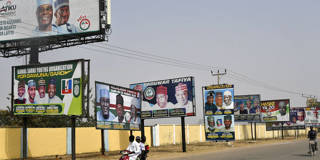 Photo by PIUS UTOMI EKPEI/AFP via Getty Images
Photo by PIUS UTOMI EKPEI/AFP via Getty Images
尼日利亚选举:破还是立
华盛顿—尼日利亚 2 月 25 日的选举可能是其自 1960 年独立以来最关键的一次。在即将离任的总统布哈里领导下经历了八年动荡之后,下一届政府有机会着手进行迟到已久的必要改革,如果做得好的话 ,可能会迎来一个爆炸性的——但愿也是包容性的——经济增长时代。
对于非洲人口最多的国家和最大的经济体来说,选举正值艰难时期。 尼日利亚正处于日益严重的债务危机之中,该国 100%的收入都用于偿还其近 2000 亿美元的国家债务,这意味着需要更多借贷来资助当前支出。 通货膨胀率为 21%,部分原因是美元长期短缺,而占其外汇收入90% 以上的原油被大规模盗窃进一步加剧了美元短缺。 失业率为33%,一半以上的年轻人尼日利亚找不到工作。
这种严峻的经济现实,加上恐怖主义和分裂主义暴力的持续威胁,导致生产力急剧下降,加剧了尼日利亚本已十分严重的贫困危机。 2000 万学龄儿童失学,2.19 亿人口中有 1.33 亿生活在多维贫困中,对精炼石油进口的浪费性补贴阻碍了政府对实现可持续经济增长所需的教育和卫生的投资。
https://prosyn.org/wNh8y2Zzh
To continue reading, register now. It’s free!
Register Now
Already have an account?
Log in



华盛顿—尼日利亚 2 月 25 日的选举可能是其自 1960 年独立以来最关键的一次。在即将离任的总统布哈里领导下经历了八年动荡之后,下一届政府有机会着手进行迟到已久的必要改革,如果做得好的话 ,可能会迎来一个爆炸性的——但愿也是包容性的——经济增长时代。
对于非洲人口最多的国家和最大的经济体来说,选举正值艰难时期。 尼日利亚正处于日益严重的债务危机之中,该国 100%的收入都用于偿还其近 2000 亿美元的国家债务,这意味着需要更多借贷来资助当前支出。 通货膨胀率为 21%,部分原因是美元长期短缺,而占其外汇收入90% 以上的原油被大规模盗窃进一步加剧了美元短缺。 失业率为33%,一半以上的年轻人尼日利亚找不到工作。
这种严峻的经济现实,加上恐怖主义和分裂主义暴力的持续威胁,导致生产力急剧下降,加剧了尼日利亚本已十分严重的贫困危机。 2000 万学龄儿童失学,2.19 亿人口中有 1.33 亿生活在多维贫困中,对精炼石油进口的浪费性补贴阻碍了政府对实现可持续经济增长所需的教育和卫生的投资。